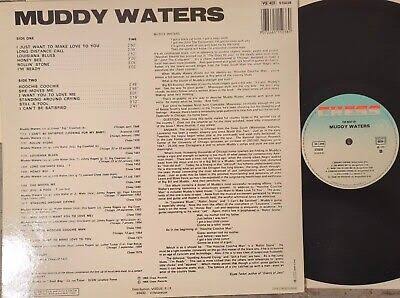
Released in 1981, King Bee is the fourteenth and final studio album by the legendary blues musician Muddy Waters. The album holds significant importance not only as his last studio recording but also as the culmination of his collaboration with Blue Sky Records and producer/guitarist Johnny Winter. *King Bee* is the third and final installment of Waters’ partnership with Winter, following *Hard Again* (1977) and *I’m Ready* (1978), both of which revitalized Waters’ career in the late ’70s.
Muddy Waters, born McKinley Morganfield in 1913 in Mississippi, is often considered the father of modern Chicago blues. His innovative fusion of traditional Delta blues with the amplified, electric sound of Chicago’s urban blues scene revolutionized the genre and inspired generations of musicians. Waters moved to Chicago in 1943, where he began to make his mark, influencing a vast array of artists, including rock legends like The Rolling Stones, Eric Clapton, and Jimi Hendrix. He is best known for iconic tracks like “Hoochie Coochie Man,” “Mannish Boy,” and “Got My Mojo Working.”
Throughout his career, Muddy Waters became known for his powerful voice, distinctive slide guitar technique, and a deep emotional connection to the blues. His shift from acoustic to electric blues in the late 1940s and 1950s paved the way for the urban blues sound that would shape rock and roll. However, by the late 1970s, after a series of commercial and creative challenges, Waters found new life through his collaboration with Johnny Winter, who had long admired him.
King Bee features a mix of traditional blues tracks and original material, once again showcasing Waters’ unparalleled musicianship and ability to remain true to his roots while embracing contemporary sounds. The title track, “King Bee,” is a reworking of the classic 
Johnny Winter’s production on *King Bee* is vital to the album’s success. Winter, himself a renowned blues guitarist, understood Waters’ artistry and knew how to bring out the best in him. Winter’s approach allowed Waters to retain his authentic sound while bringing a modern edge to the recording, which was particularly important as Waters was transitioning into his senior years. The chemistry between Winter and Waters created an album that both paid homage to the blues tradition and embraced the evolving landscape of rock-infused blues.
Although King Bee did not achieve commercial success on the level of some of his earlier records, it is widely regarded as a strong entry in his catalog. The album captures the essence of Muddy Waters’ sound in a way that was both timeless and relevant. As his final studio work, *King Bee* stands as a fitting testament to Waters’ incredible influence on blues and music in general.
Muddy Waters passed away in 1983, just two years after the release of *King Bee*. His legacy, however, remains alive through his extensive discography and the impact he made on the development of modern blues and rock music. From his early recordings in the 1940s to his later work with Johnny Winter, Waters’ contributions are immeasurable, and *King Bee* stands as a poignant reminder of the lasting power of his music.
Leave a Reply